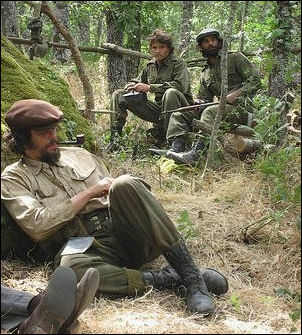Che, Steven Soderbergh’s film biography and tribute to the Cuban revolutionary and American t-shirt icon Che Guevara, disappointed critics in Cannes. Being pro-Communist just isn’t enough nowadays.

Steven Soderbergh makes entertaining films, such as Ocean’s 11 and its two sequels (well, one of the two was good), and he also makes boring, dreary films–most of his output, as it happens. He’s one of those cultural creators who is immensely talented and equally arrogant. He assumes that everyone should be interested in everything that interests him and should like everything he likes.
In sum, he appears to be a talented narcissist.
In addition, his politics come off as conventional Hollywood left wing bilge, the same form of hedonistic utilitarianism that drives what passes for thinking on the left today and somehow coexists with the American left’s enormous elitism.
Thus it makes perfect (albeit perverse) sense that Soderbergh decided to make a four-hour movie about the Cuban communist revolutionary and former male model Che Guevara in Spanish and without any "movie moments," which is how Soderbergh smugly dismisses the use of filmmaking craftsmanship to entertain, touch, and enlighten audiences.
Two decades ago Soderbergh’s film would have been a hit, at least with the critics, no matter how self-indulgent, false, and silly it turned out to be. (Remember Reds?) And as recently as a decade ago the critics would surely have given it credit for good intentions if not aesthetic success, and would have politely glossed over most of its shortcomings.
Not today, however. As noted in recent articles in this august publication, the attitude toward communism in American society and culture has taken a decidedly Reaganesque turn in recent months, a trend that I believe will only strengthen in the years to come. (I will be publishing a full essay on this subject, shortly.)
As a result, Soderbergh’s film has generated a good deal of disappointment and derision among critics who attended its premiere at the Cannes Film Festival last week. Even the Washington Post, no hotbed of right-wing conspirators, ridiculed the film:
Comrades, it is our duty to report: There were deserters.
Traitors! Too weak to sustain the continued emotional investment necessary to survive the long, tragic, long, doomed Bolivian campaign of Benicio Del Toro in Part 2 of "Che." The most highly anticipated movie of the Cannes Film Festival took a heavy toll. The premiere got underway at 6:46 p.m. and ended at 11:25 p.m. Upon seeing on the screen the words "Day 328," a faint moan could be heard in our section. But the struggle will continue. It must. Soderbergh does not yet have an American buyer for his film. Distribution or death!
Reaction to the movie was, as they say, mixed. It appears that some support Soderbergh and others have joined the résistance. At the film’s conclusion, the audience at the world premiere rose and gave Soderbergh, Benicio and their cast of internationalistas a sustaining ovation, shouting "fantastico" and "bravo!" Soderbergh, stone-faced during intermission, finally broke into a smile and waved.
But Todd McCarthy of Variety expects it will be "back to the drawing board" for an "intricately ambitious, defiantly nondramatic" work that not only avoids the usual Hollywood biopic conventions, but forgets to include "any suggestion of why the charismatic doctor, fighter, diplomat, diarist and intellectual theorist became and remains such a legendary figure."
Meaning "Braveheart" it’s not.
The Post article acknowledges that a couple of highly obscure American critics praised the film (for Indiewire and Cinematical, whatever those are), but it made it clear that both the general critical reaction and the Post’s writer’s reaction were extremely negative:
"The film reeks of authenticity but also self-indulgence. A potentially great performance by Benicio Del Toro in the title role is buried beneath Soderbergh’s stylistic tics and an almost complete lack of dramatic tension," wrote Peter Howell in the Toronto Star. "An incredibly ambitious, highly detailed mess," according to Roger Friedman at FoxNews.com.
Interestingly, the Post article reports, Soderbergh doesn’t speak Spanish and does not really care about Che’s politics:
It seems as if the weight of history weighed them down. All these details, which the film obsesses on, like they were going to be graded by Fidel. The director said he himself was not a true believer, nor was he really interested in the Cuban revolution. He was interested in Che. "He’s great movie material," said the director. "Who lived one of most fascinating lives of the last century."
Regardless of Soderbergh’s opinion of Che’s politics, it’s clear that being communist or praising communists and communism is no longer a free ticket to American cultural acceptance.

I was a fan until today,is this a way to sell T-shirts, please do not try to make this monster a hero, he was a killer just like Manson, look into his eyes in the famous picture, only difference is the star on french hat & that manson has german zastika.
S.T., I look forward to reading your essay, as I usually do. However, it seems that in the case of the movie Katyn by Andrzej Wojda, it seems that it’s still standard operating procedure according to this article by Christopher Orlet of the American Spectator:
http://www.spectator.org/dsp_article.asp?art_id=13032